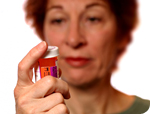
Deep Brain Stimulation Inexplicably Restores Vivid Memories
Saturday, September 06, 2008 by: David Gutierrez, staff writer
Tags: brain function, health news, Natural News
- Journo-terrorism is ‘weaponized journalism’ carried out by the Washington Post, CNN and NYT
- Journo-terrorism: NYT calls for online trolls to sabotage Breitbart.com’s revenues
- The mouth is a first responder for the immune system: New study provides clues for how the body defends against oral invaders
- Over 7,000 studies confirm turmeric’s health-protective effects
- Tomatoes found to halt stomach cancer due to anti-cancer nutrients
- Shocking report in the UK finds 95% of COVID-19 deaths were among the vaccinated
- Major meat suppliers in the USA CAUGHT using GLUE on MEAT to stick together scraps and fraudulently sell them as PRIME CUTS
- PRION-CONTAMINATED PORK ALERT: All across the United States, pigs can be "vaccinated" with millions of deadly prions via mRNA clot shots - UNLABELED
- Mike Adams and Alex Jones discuss the globalists’ MASS DEPOPULATION efforts
- CIA documents unveil evidence of enormous civilizations on ancient Mars
- Jeffrey Prather: Drone sightings a DISTRACTION from the Deep State’s plan to use suitcase nukes
- Hertz's EV debacle exposes the green tyranny scam
- BOMBSHELL: Covid-19 mRNA nanoparticles EMIT LIGHT SIGNALS that communicate MAC addresses used for self-assembly inside the blood vessels
- Vote-buying scheme FAILED: Biden drops student debt forgiveness plans
- Burn it all down: Jill consumed by vengeance as she prepares her White House exit...
- 11 Signs that the slow-motion collapse of the U.S. economy is far more advanced than most people think
- Trump vows to reclaim Panama Canal, saying it belongs to America
- Calling it a ‘necessary first step to stop Weaponization of the Federal Government,’ house issues 17,000-page report
- BOMBSHELL: Covid-19 mRNA nanoparticles EMIT LIGHT SIGNALS that communicate MAC addresses used for self-assembly inside the blood vessels
- PRION-CONTAMINATED PORK ALERT: All across the United States, pigs can be "vaccinated" with millions of deadly prions via mRNA clot shots - UNLABELED
- Does aging BEGIN in the brain? Development of new neurons slows down as we get older, followed by regular signs of aging
- Brighteon.com: The pro-liberty answer to YouTube censorship is now less than 60 days away from launch
- The mouth is a first responder for the immune system: New study provides clues for how the body defends against oral invaders
- Scientists confirm: GENIUS brain function can be spontaneously unleashed in humans without any apparent cause
- Drones in the sky, danger on the ground: Orland accident is a national security wake-up call
- Tomatoes found to halt stomach cancer due to anti-cancer nutrients
- 10 Habits all preppers follow
- Bill Gates’ creepy, costly plan to destroy the atmosphere and store CO2 underground MOVES FORWARD in Canada
- Trump says EVERYONE on the January 6th "Committee" could face jail time for lies and deception that has hundreds of innocent protesters suffering and dying in DC gulags
- Rudy Giuliani appears to call for MURDERING two-year-old Palestinian children, claiming they might represent a future risk to Israel and America
- HYSSOP: What research reveals about the health benefits of this ancient holy herb
- Casual restaurant chain TGI Fridays files for BANKRUPTCY
- Michael Yon warns of a ZIONIST TAKEOVER in Trump’s second administration
- Careless Whisper: AI-powered transcription tool being used by hospitals found to invent chunks of text no one ever said
- Texas AG Ken Paxton files lawsuit against El Paso pediatrician for illegally prescribing gender transition drugs and therapies to minors
- CEO's murder sparks security scramble in greed-driven healthcare industry
- Michael Yon warns of a ZIONIST TAKEOVER in Trump’s second administration
- Instead of adding PINK RIBBONS to products for "Cancer Awareness" month, companies should actually remove the ingredients that CAUSE cancer
- Casual restaurant chain TGI Fridays files for BANKRUPTCY
- BBC staffers accuse media outlet’s executives of instituting bias in Gaza coverage, claiming favorable treatment of Israel
- HYSSOP: What research reveals about the health benefits of this ancient holy herb
- Texas AG Ken Paxton files lawsuit against El Paso pediatrician for illegally prescribing gender transition drugs and therapies to minors
- Humiliation campaign: Israel arrests Palestinians in West Bank, writes number on their foreheads
- West not taking seriously enough the threat of a nuclear attack by Moscow, warns former Russian president
- Bombshell US House investigative report confirms that almost everything the alternative media said about COVID origins, lockdowns, masks, vaccines and government overreach was TRUE
- Former Israeli PM Ehud Olmert says Netanyahu is the real enemy - not Iran or Hezbollah
- Careless Whisper: AI-powered transcription tool being used by hospitals found to invent chunks of text no one ever said
- Scientists confirm: GENIUS brain function can be spontaneously unleashed in humans without any apparent cause
- Elon Musk, Trump’s pick for Department of Government Efficiency (DOGE), wants to cut U.S. budget by “at least $2 trillion”
- Four Palestinian journalists killed in Gaza airstrike, death toll of journalists reaches 182
- Constitution Party presidential candidate launches ads to steer votes away from infanticidal Kamala Harris
- Rudy Giuliani appears to call for MURDERING two-year-old Palestinian children, claiming they might represent a future risk to Israel and America
- Trump says EVERYONE on the January 6th "Committee" could face jail time for lies and deception that has hundreds of innocent protesters suffering and dying in DC gulags
- Judge rules against AstraZeneca for breaching COVID “vaccine” contract with trial participant injured by experimental jab
- Red Cross issues warning to stop blood plasma donations from vaccinated people
- Scientists confirm: GENIUS brain function can be spontaneously unleashed in humans without any apparent cause
- DATA: England’s vaccinated population had close to one million deaths in 23 months; unvaccinated population had less than 61,000 deaths over the same period
- Arizona residents drive entire Maricopa County Board of Supervisors out of meeting after serving them for TREASON
- Heavily CENSORED Pfizer documents show that COVID began a five-year mass DEPOPULATION agenda that will reach completion by 2025
- Today I asked our AI language model “Neo” about which phytonutrients or phytochemicals can block the spike protein related to SARS-CoV-2 … Here is what it answered…
- Fully vaccinated about to see “tsunami” of illness and death, warns virologist
- BREAKING: 2025 NDAA authorizes mandatory military draft of WOMEN across America… as Pentagon pursues global NUCLEAR war with both Russia and China at the same time
- Former Bill Gates vaccine scientist predicts sharp population decline: “up to 30-40% in highly vaccinated countries”
- We are building the infrastructure of human freedom… Brighteon.AI is the next launch that will put life-altering LLM technology into your hands for free
- NASA admits that climate change occurs because of changes in Earth’s solar orbit, and NOT because of SUVs and fossil fuels
- Michael Yon warns of a ZIONIST TAKEOVER in Trump’s second administration
- ENGINEERED FAMINE: Oregon starts SHUTTING DOWN small farms “to protect the people”
- 5G REMOTE KILL VECTOR: Science paper reveals cell phone signals can activate the release of biological PAYLOADS from graphene oxide injected into the body
- Ozempic and Wegovy weight loss drugs are injectable LIZARD VENOM PEPTIDES that may unleash a devastating wave of organ failure… side effects align with symptoms of SNAKE BITES
- These 13 countries just signed an agreement to engineer a global FAMINE by destroying food supply
- Spin-off DISEASE: Fully vaccinated for COVID manifesting new disease called VEXAS syndrome
- BILLIONS still expected to die in coming years from COVID “vaccines,” says analyst
Researchers at the Toronto Western Hospital in Ontario, Canada, were operating on an obese man in an attempt to find a part of the brain that could suppress the appetite when stimulated electrically. When the scientists stimulated the hypothalamus, which has been associated with hunger, the man suddenly experienced a vivid memory from 30 years before.
"He reported the experience of being in a park with friends from when he was around 20 years old and, as the intensity of stimulation increased, the details became more vivid. He recognized his girlfriend [from the time] ... The scene was in color. People were wearing identifiable clothes and were talking, but he could not decipher what they were saying," the researchers wrote.
The researchers implanted a device in his brain that would constantly stimulate that section of the hypothalamus. Similar devices have been implanted in other parts of the brain to control tremor in Parkinson's disease.
After three weeks of stimulation at a level low enough to avoid triggering the park memory again, the man's performance on two memory tests improved significantly.
While the hypothalamus has not previously been associated with memory, it borders a part of the brain that is known to influence memory and emotion.
The researchers are now testing the device to see if it can stem the memory loss associated with Alzheimer's disease.
"It is a very effective treatment for the motor problems associated with Parkinson's disease and it has been used on 40,000 people," Lozano said. "We are in the early stages of using it with Alzheimer's patients and we don't know if it will work. We want to assess if we can reach the memory circuits and drive improvement. It is a novel approach to dealing with this problem."
Brain function at FETCH.news
Get independent news alerts on natural cures, food lab tests, cannabis medicine, science, robotics, drones, privacy and more.
Take Action: Support Natural News by linking to this article from your website
Permalink to this article:
Embed article link: (copy HTML code below):
Reprinting this article:
Non-commercial use OK, cite NaturalNews.com with clickable link.
Follow Natural News on Facebook, Twitter, Google Plus, and Pinterest
Science News & Studies
Medicine News and Information
Food News & Studies
Health News & Studies
Herbs News & Information
Pollution News & Studies
Cancer News & Studies
Climate News & Studies
Survival News & Information
Gear News & Information
News covering technology, stocks, hackers, and more



"Big Tech and mainstream media are constantly trying to silence the independent voices that dare to bring you the truth about toxic food ingredients, dangerous medications and the failed, fraudulent science of the profit-driven medical establishment.
Email is one of the best ways to make sure you stay informed, without the censorship of the tech giants (Google, Apple, Facebook, Twitter, YouTube, etc.). Stay informed and you'll even likely learn information that may help save your own life."
–The Health Ranger, Mike Adams













































